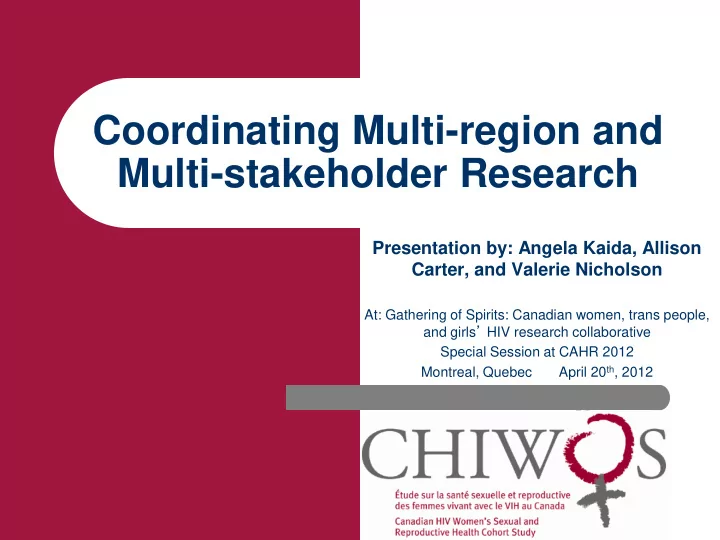

Coordinating Multi-region and Multi-stakeholder Research Presentation by: Angela Kaida, Allison Carter, and Valerie Nicholson At: Gathering of Spirits: Canadian women, trans people, and girls ’ HIV research collaborative Special Session at CAHR 2012 Montreal, Quebec April 20 th , 2012
Conflict of interest disclosure We have no conflicts of interest.
CHIWOS Study Goals Among HIV-positive women – To assess barriers to and facilitators of women-specific HIV/AIDS services use – To assess the impact of such patterns of use on sexual, reproductive, mental and women ’ s health outcomes Hypotheses: – Usage of women-specific services will a) be lower among more marginalized and stigmatized communities, and b) be shown to correlate with improved sexual, reproductive, mental and women ’ s health outcomes
Study Design (Overview) Five year, multi-site, prospective cohort study that is rolling out in BC, ON and QC Target sample size = 1,250 HIV-positive women Operates within women-centred CBR and GIPA approaches Two phases: – Formative phase (wrapping up) – National survey phase (launch in Fall 2012) Recruitment at clinics, ASOs, online, word-of-mouth, peer-driven Aims to enrol 350 women each in BC and QC; 550 women in ON Participants will complete a Peer Research Associate (PRA)- administered survey at baseline (Wave 1) and again 18 months later (Wave 2)
Study Team Structure British Columbia Ontario Quebec Core Research Core Research Core Research Team Team Team 24 National Survey Development National Core Research Team Working Groups National Steering Committee National Research Team Management Team Sampling, Recruitment and Data Management Committee National Principal Investigators Mona Loutfy, Alexandra de Knowledge Transfer Pokomandy, Bob Hogg, Angela Kaida and Exchange (KTE) Working Group CHIWOS Aboriginal Advisory Board: Prioritizing the Health Needs of Positive Aboriginal Women (CAAB-PAW) British Columbia Ontario Quebec Community Community Community Advisory Board Advisory Board Advisory Board
(Some) Challenges of Collaborative Research Tension and inequities in CBR stakeholder relationships E.g., PRA contributions as ‘ volunteers ’ vs. salaried research staff – Addressing challenge (e.g.): Commitment to the Meaningful Involvement of Women living with HIV – (MIWA) and seeking innovative ways to facilitate this involvement Diverse regional profiles, capacity, and priorities E.g., ACB women in ON, refugee women in QC, and IDU and Aboriginal women in BC – Addressing challenge (e.g.): National topic-specific survey development working groups – Negotiating and valuing diversity in stakeholder needs, incentives, priorities, etc E.g., Research interests vs . ‘ Action ’ – Addressing challenge (e.g.): Commitment to relationship and trust building, open communication, – and transparency Funding E.g., $1.19M across 5 years across 3 provinces across multiple provincial stakeholders/sites = not – enough funding. Addressing challenge (e.g.): Apply for additional funding, in-kind support –
(Some) Facilitators of Collaborative Research Strong and well-connected leadership team E.g., Pre-existing multi-sector relationships – Multi-institution engagement E.g., Diverse capacities and strengths – Team commitment to continual learning and capacity building E.g., Creating opportunities for everyone to celebrate existing capacities and build on – their knowledge, skills and abilities Enthusiasm! E.g., Internal and external, potential for transformational change –
Perspective of a CHIWOS Peer Research Associate (PRA)
Perspective of a CHIWOS Peer Research Associate (PRA)
Acknowledgements Thank you to CHIWOS ’ s co-PIs, provincial co-ordinators, PRAs, and the entire national core research team Thank you to the Steering Committee members, CAB members, CAAB- PAW members, and all the co-investigators, collaborators, working group members, and community partners committed to this study Thank you to our funders: CIHR (Institute of Gender and Health) and the CTN
Recommend
More recommend